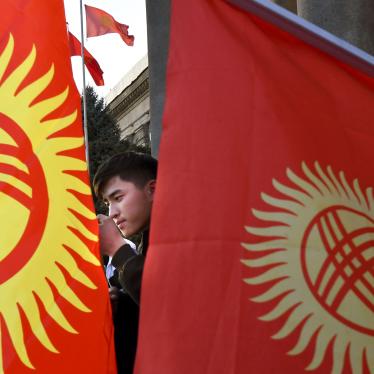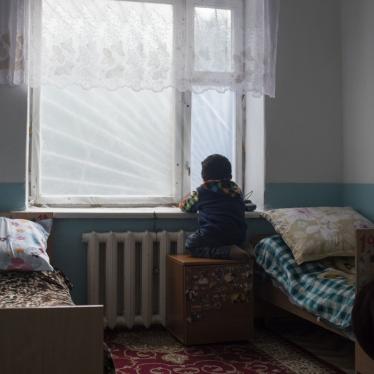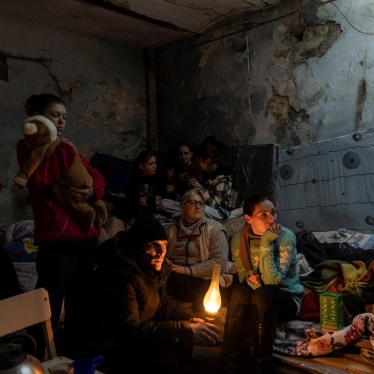24 February 2021
Mr. Sadyr Japarov
President
Republic of Kyrgyzstan
Dear President Sadyr Japarov,
On behalf of Human Rights Watch, please accept my regards. I am writing at the outset of your tenure as President to raise Human Rights Watch’s concerns regarding pressing human rights issues in Kyrgyzstan that we consider merit your attention.
As you may know, Human Rights Watch is an international non-governmental organization working in over 90 countries worldwide. We have conducted research and carried out advocacy in Kyrgyzstan for over 20 years. Throughout we have consistently sought out a constructive dialogue with the authorities of Kyrgyzstan on a range of issues related to human rights and the rule of law, including, for example, freedom of expression, fair trial standards, the prevention of torture, and domestic violence.
During your presidential campaign we noted that you joined the “Agreement on rights and freedoms” on 23 December 2020, pledging to guarantee freedom of speech, democracy, rule of law and human rights in Kyrgyzstan. In your inauguration speech you stated that you have a dream that Kyrgyzstan will become an economically developed, dynamic, strong and free country, where human rights are respected, rule of law is supreme, and youth are optimistic about their future. In light of your stated commitment to ensuring human rights are protected in Kyrgyzstan, and in the spirit of constructive engagement, we are writing to share our recommendations on concrete steps the Kyrgyz government can take to improve the human rights situation in the country.
We hope that you will use your good offices to ensure improvements in the following key areas in accordance with the international human rights treaties that Kyrgyzstan has voluntarily ratified:
Ensure return to rule of law in political processes
Following the contested parliamentary elections in October 2020, a period of political uncertainty unfolded in Kyrgyzstan, leading to former president Sooronbay Jeenbekov stepping down, efforts to rush through sweeping changes to Kyrgyzstan’s constitution by a caretaker parliament, and an interim government holding power until early presidential elections could be held. It is critical that your government commit to ensuring rule of law in political processes as a matter of urgency.
In particular, the current caretaker parliament should refrain from considering or passing far-reaching legislative reforms such as the proposed draft constitution. As a caretaker parliament, its focus should be on discharging essential governance functions in line with the established rule of law until the will of the people is expressed in a free and fair election. We thus urge you to ensure that new parliamentary elections are held as soon as possible to facilitate a speedy return to rule of law in political processes in the country. We also call upon your government to ensure the organization of the Constitutional reform process is in accordance with standards set out in the Constitution and that any proposed changes to the Constitution comply with international human rights treaties that Kyrgyzstan has ratified.
Address election shortcomings
Although fundamental freedoms were “generally respected” at the 10 January presidential elections according to the preliminary report by the Organization for Security and Cooperation in Europe’s Office for Democratic Institutions and Human Rights (OSCE/ODIHR) election monitoring mission, the report also raised some serious concerns. It found that the public discourse around the elections was disproportionately dominated by your campaign, “resulting in an uneven playing field”. The report found that all state-affiliated media and broadcasters unilaterally promoted the presidential option in the referendum of the form of government as the only viable choice. This deprived citizens of opportunities to make well-informed choices. While significant changes to the electoral legislation have been made since the last elections in terms of voter registration and preventing voter fraud, there were still reports of widespread abuse of administrative resources, as well as involuntary rallying of staff at government-affiliated institutions and universities.
Kyrgyzstan should commit to working with OSCE/ODIHR to address these shortcomings and follow up on its recommendation to review relevant legal provisions especially as other elections and a referendum are planned this year.
Covid-19: Protect public health and ensure lasting protection for vulnerable groups
The Covid-19 pandemic has posed acute human rights challenges globally, including in Kyrgyzstan, and resulted on occasions during 2020 in unfounded bans on peaceful assemblies, and threats of criminal sanctions or investigations for spreading “false information” about the virus against doctors and others who raised concerns about the Kyrgyz government’s response.
We urge your government to continue prioritizing human rights in your responses to the pandemic, for instance in providing access to healthcare for all and ensuring steps taken to protect the public are proportionate and non-discriminatory. It is necessary to protect marginalized groups, including older people, people with underlying health conditions, and people in detention and closed institutions for older people and for children and adults with disabilities. We call on your government to ensure that economically vulnerable people receive basic social protection. The media should be allowed to report on developments linked to the pandemic and ensure the public is fully informed about the spread of the virus and steps the government is taking. Healthcare workers should be free to report working conditions without the threat of sanction by law enforcement or their employers.
During the Covid-19 related lockdown measures in 2020, reported cases of domestic violence increased in Kyrgyzstan. However, life-saving services for survivors of violence faced operational constraints and many women struggled to gain access to shelters and other essential protections. We urge you to ensure that pandemic-related measures do not inhibit women and girls facing domestic abuse or the risk of such violence from seeking help and that the government supports uninterrupted operation of services sufficient to meet the needs of survivors.
We also encourage you to ensure all children and young people have access to educational resources as the pandemic unfolds.
Provide accountability for June 2010-related abuses
In the ten years since the June 2010 ethnic violence in southern Kyrgyzstan, Kyrgyz authorities have failed to adequately address abuses in the south, in particular against ethnic Uzbeks, who endured the majority of casualties and destroyed homes, and who were disproportionately subjected to arbitrary detention, ill-treatment and torture, as well as extortion schemes in the aftermath of the violence. In an interview on January 11, you indicated your intention to overcome the south-north divide in the country and made clear your view that all Kyrgyzstanis are equal. To that end, we call on you to acknowledge and address the injustices, abuse, and torture committed disproportionately against ethnic Uzbeks during and in the aftermath of June 2010 events. While southern Kyrgyzstan is no longer a site of open ethnic conflict, until there is accountability for past abuses, there will always be legitimate concerns about the prospect of long-term stability in the region.
Accountability for the death in custody of Azimjon Askarov
The death in custody of Azimjon Askarov, a wrongfully imprisoned human rights defender, has left a dark stain on Kyrgyzstan’s human rights record. At the time of his death Askarov had served 10 years of a life sentence that was imposed by an unfair trial on politically motivated charges. The United Nations Human Rights Committee (HRC) in 2016 issued a decision finding that Askarov was arbitrarily arrested and tortured and calling for his release. Askarov’s health sharply deteriorated in the days leading up to his death in July 2020, but prison officials denied him adequate medical treatment.
It has been more than six months since Kyrgyzstan’s prison administration (GSIN) opened an investigation into the circumstances of Askarov’s death, yet there has been no discernable progress in bringing to justice those responsible for his wrongful imprisonment, denial of medical care, or his death. We call on you to commission an independent, impartial investigation into Askarov’s wrongful imprisonment, denial of adequate care, and death in custody. Kyrgyzstan should not only provide accountability for Askarov’s death in custody, but also ensure his legal rehabilitation and that his family is compensated.
You mentioned during your campaign that the judicial and prison systems of Kyrgyzstan need thorough reforms and that you intend to focus on these issues. We urge you to make Askarov’s case a priority in this task.
Reaffirm the importance of civil society: protect freedom of association and assembly
We call on you to reaffirm the importance of civil society in the democratic development of Kyrgyzstan and to bring an end to any undue interference or efforts to limit the important work of human rights defenders in the country, including interference with their rights to peaceful assembly and freedom of expression. Last year on March 8, police ended a peaceful International women’s day march in Bishkek, detaining about 70 activists and holding them without telling them the grounds for their detention or providing them access to lawyers. Also last year, Parliament advanced a widely criticized bill on non-governmental organizations (NGOs) that, if implemented, would impose additional, unjustified and burdensome financial reporting requirements on civil society groups.
We also call on you to lift restrictions on foreign human rights workers’ access to Kyrgyzstan. Over the last six years, several human rights workers, including Human Rights Watch’s Bishkek office director and senior researcher Mihra Rittmann and Russian human rights organization Memorial’s Vitaliy Ponomarev, have been banned from Kyrgyzstan. These developments have contributed to an increasingly hostile environment for human rights activism in Kyrgyzstan and we call on you to lift these bans.
Guarantee freedom of expression and free access to information
Both in campaign interviews and following your victory, you noted that freedom of expression and media will not be endangered in Kyrgyzstan under your leadership. Over the past few years police have variously harassed journalists, including during and after the political unrest in October 2020. Kyrgyzstan’s Parliament in June 2020 attempted to pass a vague and overly broad law on “manipulating information” that would allow authorities, without judicial oversight, to order the removal of information that officials consider “false” or “inaccurate” from internet platforms. Such bills are incompatible with Kyrgyzstan’s international human rights commitments to uphold free speech.
We urge you to condemn any unfounded attacks on the media and on free speech, and to guarantee that critical media outlets and journalists can carry out their important work without fear of harassment or retaliation.
Ensure inclusive education for children with disabilities
You have highlighted both the public health and education sectors as critical for the economic development of the country, as well as the personal well-being of citizens. Last year Human Rights Watch published a 74-page report on institutionalization and barriers to education for children with disabilities in Kyrgyzstan which highlights how government bodies, specifically the Psycho-Medical-Pedagogical Consultations (PMPC), deny children access to quality, inclusive education, in which children with and without disabilities study together in mainstream schools. As a result, thousands of children with disabilities in Kyrgyzstan are segregated in residential institutions, where they may experience neglect, inappropriate medical treatment, and discrimination. Children and people with disabilities are equal citizens of the Kyrgyz Republic, and as such must have equal access to quality education and healthcare.
Kyrgyzstan ratified the Convention on the Rights of Persons with Disabilities in 2019 and has already pledged to close some residential institutions. These are important first steps. We call on the Kyrgyz government, under your leadership, to take urgent and meaningful steps to ensure that children with disabilities can grow up in a family and study in their own communities along with their peers. We urge your government to make inclusive education for children with disabilities a priority and to abolish bodies, such as the PMPCs, that block children’s access to education.
Ensure accountability for violence against women and girls
Domestic violence against women and girls continues to be a pervasive and urgent problem in Kyrgyzstan and perpetrators are rarely held accountable. Domestic violence remains classified as a misdemeanor rather than a criminal offense, which creates further barriers for women and girls seeking help or accessing justice. Although Kyrgyzstan adopted a strengthened domestic violence law in 2017 that provides better protection for victims, authorities do not routinely enforce measures to keep victims safe, such as protection orders that limit contact between an abuser and his victim, preventing further abuse and escalation.
Survivors of domestic abuse also continue to face significant barriers to accessing justice, including a lack of legal assistance, inaction by authorities once complaints are registered, and pressure to drop charges. As a result, impunity remains the norm in cases of domestic abuse.
We call on you to make combating domestic violence a priority for your term, including by ensuring allocation of sufficient resources to make laws effective and meaningful for survivors of domestic abuse. In particular, we urge you to ensure greater support for: the provision of critical services including shelters, medical and psychological support and legal aid; capacity-building of judicial personnel and police to respond to, investigate, and prosecute cases; better staffing and management of hotlines for abuse victims, and training of emergency response personnel to staff it; national coordination of strategic measures to combat domestic violence and impunity for such violence.
Labor rights
Parliament in early November 2020 advanced in its second reading a restrictive trade union law. The bill would grant the Federation of Trade Unions a monopoly over all federal-level union activity and require industrial and regional trade unions to affiliate with the federation, undermining trade union pluralism and the right of trade unions to freely determine their structures and statutes. We remind you that the draft law would also violate Kyrgyzstan’s international commitments at the International Labor Organization (ILO) and would seriously undermine Kyrgyzstan’s compliance with the requirement of implementing ILO conventions under the European Union’s special incentive arrangement for sustainable development and good governance (GSP+).
We are also concerned about the months-long harassment of a number of trade union leaders by law enforcement officers who have opened multiple criminal investigations against them, and about interference by authorities in the planned organization of a Congress by the federation.
Kyrgyzstan’s leadership should respect the right of trade unions to associate and organize freely, not meddle in internal trade union activities and processes.
Thank you for your attention to these pressing human rights concerns in Kyrgyzstan. We hope that this letter can be a basis for a constructive dialogue and would welcome opportunities to discuss these important matters with you or members of your administration in person.
Sincerely yours,
Hugh Williamson
Executive Director
Europe and Central Asia Division
Human Rights Watch








